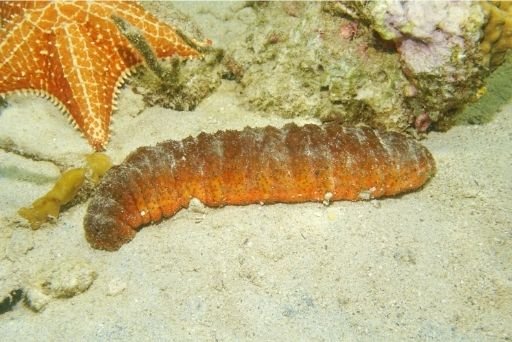Sea Cucumber and their glorious poop that exceeds the mass of five Eiffel Towers
The seabed is graced by marine invertebrates. These creatures are usually oblong shaped and seem like a chubby cucumber known as sea cucumbers. These organisms belong to animal groups, echinoderms. Their feet are like tiny tentacles shaped in a tube. They are present in all marine life around the world. These creatures are benthic, living on the seabed, and they have planktonic larvae. They float with oceanic currents.
Please don’t go on their name and assume them to be refreshing. Instead, they are famous for their glorious pooping and are said to excrete 64000 metric ton collectively, i.e. exceeding 70000 ton, each year. The sea cucumbers excrete sandy, bubbly and a spiralling poop.
A study published in the coral reef journal states that the number displayed above is undervalued. Shockingly, this much poop is found on a sole coral reef, imagine how much sea cucumber poop in the entire world.

The Shocking Fact About Their Poop
The study was conducted on sea cucumbers existing on Heron Island reef. This island is placed towards the south of the Great Barrier Reef of Australia and is 19 square kilometres long with a central lagoon.
The research was done by filming the flats of the lagoon’s brink, which are shallow ranges of the reef. For this, drones were used, and the team studied the collected video footage of sea cucumbers. By this, scientists hypothesized the number of sea cucumbers, which exceeds 3 million around the entire Heron Island.
Further, scientists studied the lollyfish, i.e. black sea cucumber(Holothurian atra) in their labs by nurturing them. In this feeding probe, a singular sea cucumber defecated around 38 grams, i.e. 1.3 ounces of faeces in a day. Thus, it was concluded that 14 kilograms of poop would be produced each year.
The authors of the journal exclaimed that collectively these chubby creatures defecate over and above the weight of five Eiffel towers. Thus, these 3 million altogether produce a lot more poop on heron Island than we can imagine.
The Underrated Results
A marine ecologist, Vincent Raoult, working at the University of Newcastle stated in a tweet that reef lagoons were not included in the research and hence, this amount of poop is hugely underrated. He added that the global scale of these squishy creatures poop dumped in our ecosystem is insurmountable.
The poop of sea cucumber is vital for the formation of coral reefs, and we must give importance to it. These faeces maintain the wellbeing of our oceans. It has been found that sea cucumbers have the same taste as that of Underwater earthworms.
They feed on organic matter on the seabed such as marine creatures and small bits of algae, aquatic invertebrates and sometimes waste particles. During digestion, this matter is broken down into useful byproducts and released into the sea as poop, including indigestible sand.

Coral formations require a basic environment and sea cucumbers aid in this. They do it by pooping! The poop of sea cucumber is basic in nature, and this decreases the acidity of encompassing waters. This helps in the formation of calcium carbonate skeletons of coral. Additionally, the poop contains calcium carbonate itself, a significant element for coral creation.
The poop has ammonia as its byproduct, which fertilizes and supports the expansion of corals. So the massive chunk of poop should not be bothersome; instead, it should be appreciated!
How Humans Are Using Their Poop?
A marine biologist, Jane Williamson from Macquarie University, said that sediment is turned over by sea cucumbers which in turn oxygenates debris and is a source of food, full of nutrients for other living organisms on coral reefs. This is of great importance for life to thrive over reefs. Surprisingly, all of this is done by poop!
She also points out that these nutrients will remain of no use and trapped in case sea cucumbers did not feed and excrete sediments. Most life on the seabed will not be able to feed appropriately if that ever happened.

We have read how important sea cucumbers are for coral reefs and the surrounding environment. Yet they are threatened, and overfished. Sea cucumbers are considered as a delicacy in Asia and are considered as a high protein delight. They are prized up to $3500/kilo. This results in increased demand for them and promotes their killing. They are also used by certain pharmaceutical companies, in making medicines for cancer treatment furthering their fishing.
The University of Newcastle has stated that presently, seven species of sea cucumbers are endangered, and nine are said to be “vulnerable to extinction. If the number of these creatures go down, so will the number of coral reefs. With the decrease of sea cucumbers, sediment turnover will be much lesser, which will threaten the existence of coral reefs.
No one would have thought that an organism named after cucumbers would be known so much for pooping. These creatures genuinely seem to be at work with it.




